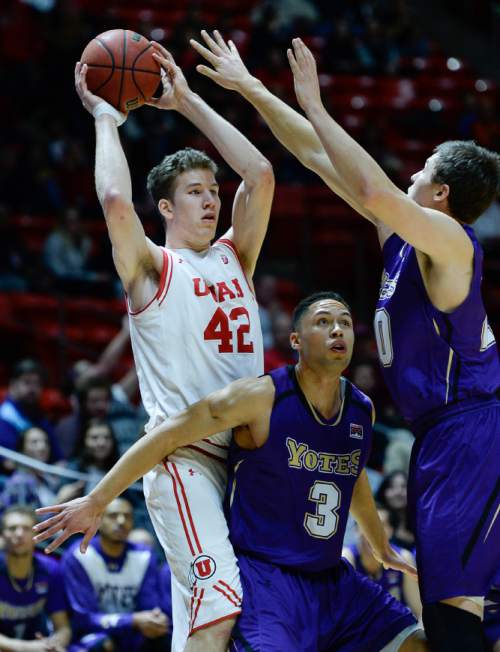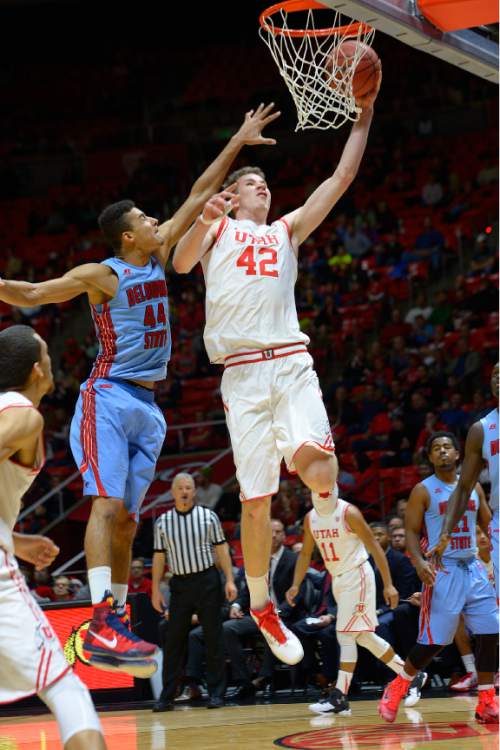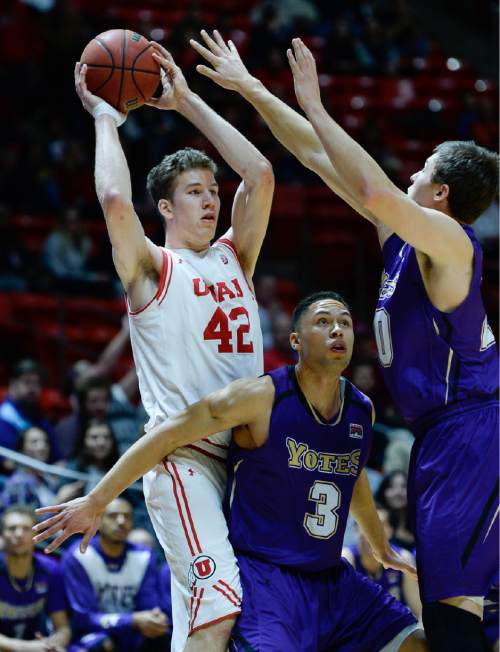This is an archived article that was published on sltrib.com in 2016, and information in the article may be outdated. It is provided only for personal research purposes and may not be reprinted.
Berkeley, Calif. • When he was 12 years old, Jakob Poeltl already towered over most people he met. So standing out in a crowd is nothing new for Utah's sophomore center.
But something curious happened over the summer in Vienna: For the first time, a stranger knew his name.
"He asked if I was Jakob Poeltl, and then he asked for a picture," he said, acquiescing to the selfie request. "I definitely wouldn't say I'm a celebrity. But people started recognizing me on the street, and that's never been the case before."
It would be more commonplace in Utah, where Poeltl is the star player for a Runnin' Utes squad that packs in 12,800 fans a night. But followers are sprouting in his home country of Austria, where Poeltl might have a hard time finding a pickup game or watching a basketball game on TV.
Basketball is small-time in Austria. The national team has played in the "B" division of Europe for years and hasn't qualified for EuroBasket since 1977. Soccer, skiing and ice hockey rule in the alpine nation. Basketball trails far behind, making it something of a quaint hobby for a young Austrian.
With Poeltl — considered a lottery pick should he enter next summer's NBA Draft — there's suddenly a figure to follow in the barren landscape of Austrian basketball. The growing fan base in the country hopes that as Poeltl rises, he elevates the sport with him.
"There are really a lot of sports fans in Austria following Jakob's college career," Austrian journalist Ernst Weiss wrote in an email to The Tribune. "It should have high impact on basketball in our country."
Poeltl is also making a name for himself in the States, where the 7-footer leads Utah in points (17.6 per game), rebounds (9.2) and blocks (2.1). His name dots the watch lists for the Oscar Robertson Trophy, the Naismith Award, the Kareem Abdul-Jabbar Award and more.
Ahead of Friday's game vs. Stanford, Cardinal coach Johnny Dawkins called Poeltl a "throwback" in an increasingly guard-oriented game, but also an inter-generational talent.
"He's big, but very skilled," Dawkins said. "[Larry Krystkowiak and I] played in the '80s and '90s. He could play in our generation as well as this current generation, which says a lot about his talent."
But Poeltl's skill set is something new in Austria, which has never produced an NBA player. He's far from a national phenomenon, but the novelty of his story is generating more and more interest.
Martina Poeltl, Jakob's mother, said they've gotten more media requests from European outlets as Poeltl's profile grows.
"We try to keep it to a low level and have them avoid contact with Jakob directly," Martina said. "But he's getting more attention and more coverage."
European basketball powers have at least one common trait: NBA stars. Spain has the Gasol brothers. France has Tony Parker. Serbia's and Croatia's NBA players would form a pretty good team on their own, headlined by former Sacramento Kings Vlade Divac and Peja Stojakovic.
Next door to Austria, German basketball credits much of its popularity to one person: Dirk Nowitzki. The 7-foot sharpshooter for the Dallas Mavericks has inspired a generation of kids to pick up a basketball, which has given rise to more robust youth leagues.
He wasn't the first German in the NBA — and it would be remiss to not acknowledge the stellar career of Detlef Schrempf — but Nowitzki, the only European MVP, is arguably one of the best players in league history. He's an icon.
"He changed basketball," Jazz forward and German native Tibor Pleiss said. "There was more concentration on basketball. The [German] league got stronger and stronger."
Poeltl recognizes his potential influence in his native country. He doesn't need to be the next Nowitzki to drive interest in the sport —that's a lot to expect from a 20-year-old — but he doesn't shy from it. If his success in basketball can convince more kids to shoot hoops in gyms and on playgrounds, he's willing to take it on his shoulders.
"Actually I don't mind interacting with the fans, especially if helps popularize basketball in Austria," he said. "There could be a lot of lost talent, kids who never started playing basketball because they never knew about it or heard of it. I really hope it's going to help. My generation [has] a couple talented young players, and hopefully we can make basketball bigger."
In this instance, "generation" is a loose term. The Austrian national team — for whom Poeltl started playing last year — has one pro, Anton Maresch, in Spain and another, Enis Murati, in Belgium. Poeltl is both younger and the more promising NBA prospect.
When Poeltl had a chance to become the first Austrian to play in the NBA last spring (Krystkowiak said every NBA team told him Poeltl would go in the first round), some back in the homeland were impatient. Weiss said the media coverage he saw was split "about 50-50" on whether Poeltl should go pro or stay in school.
The Poeltl family kept a tight circle on the decision, but Jakob acknowledged that he felt some patriotic pressure to enter the draft.
"A lot of people were hoping for me to go to the NBA, probably because it's a common thing to do in the situation I was in last year," Poeltl said. "I really didn't worry about that. I was going to do it my way. But I think a lot of people were wishing I would go."
The way things have gone in Utah, the Poeltls are happy with their decision. Jakob's parents and sister visited him in New York, then rented a house in Salt Lake City to spend the holidays together (for the second consecutive year). As they put it, they "made up for lost time" — playing board games, eating family meals, and simply catching up on the normal things they used to all do together.
They know Jakob's trajectory toward the NBA means there will be less time for these precious moments. But there will be time to worry about that down the road. For now, the family is enjoying Utah.
"There's no doubt staying in school was a good decision," Martina Poeltl said. "He's happy. He's playing well. That's what matters to Jakob, and that's what he's focused on."
Several years ago, Pleiss said he worked one-on-one with the then-teenage Poeltl, who was a budding Austrian star. He also got a chance to watch Poeltl this summer, when Germany played Austria in friendly competition (Pleiss didn't play as a part of his NBA contract).
Pleiss saw an energetic competitor: Poeltl scrapped for rebounds, dived on the floor for loose balls, ran the floor, and even when he was on the bench he was cheering on teammates. Pleiss said he understood why Austrian basketball has so much hope pinned to him.
"When we had a German do well in the NBA, basketball got much more popular," he said. "Maybe he can do the same for Austria."
Twitter: @kylegoon —
About Jakob Poeltl
• Averaging 17.6 ppg, 9.2 rpg, 2.1 bpg, 1.9 apg in 14 games as a sophomore
• Appeared in five Austrian national team friendlies this summer, averaged 10.8 ppg, 5.0 rpg, 1.6 bpg
• On the watch list for Oscar Robertson, Naismith, Kareem Abdul-Jabbar Awards
• Ranked No. 9 on DraftExpress 2016 mock draft, No. 7 on ESPN mock draft —
No. 21 Utah at California
P At Haas Pavilion, Berkeley, Calif.
Tipoff • 5:30 p.m. MST
TV • Pac-12 Network Radio • 700 AM
Records • Utah 11-3, 0-1; Cal 11-3, 1-0
Series history • Cal leads, 12-11
Last meeting • Utah 76, Cal 61 (Feb. 15, 2015)
About the Utes • Utah is still seeking its first road win of the season, and its first since winning at Washington State last season in March. … Utah is 20th nationally in total blocks, with 76 this year, and is led by sophomore center Jakob Poeltl with 2.1 bpg. … Utah is coming off its worst free throw shooting percentage since the 2011-12 season, hitting 11 for 24 against Stanford.
About the Golden Bears • Cal has held its last six opponents to a combined 34 percent shooting, going 5-1 in that stretch. … The Golden Bears have five players averaging 9 or more points per game, led by junior guard Tyrone Wallace with 15.6 ppg. … Stat site KenPom ranks Cal with the best 2-point percentage defense in the country (36.7 percent), and at least four Cal players have double-digit blocks this year.







